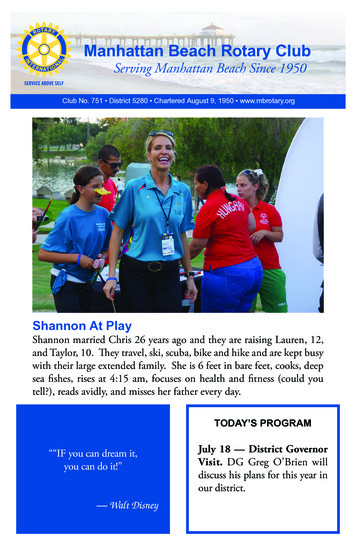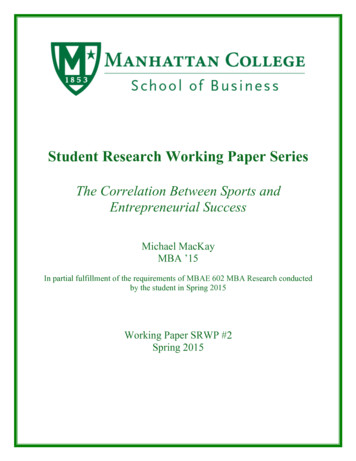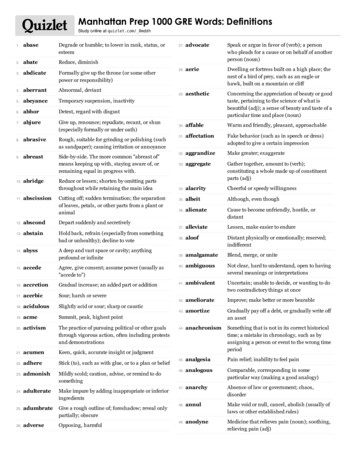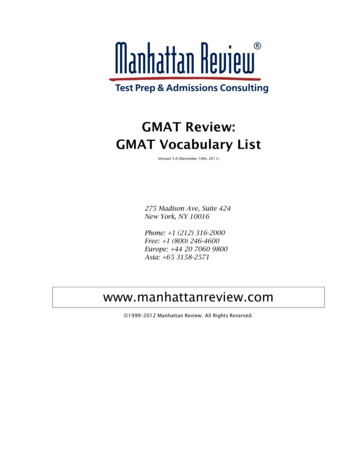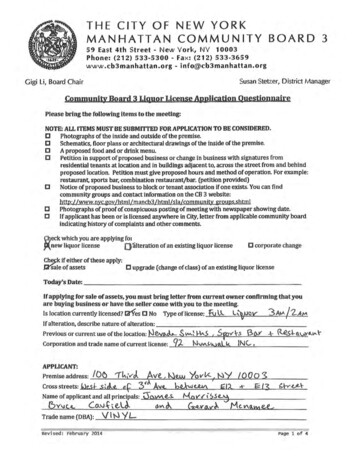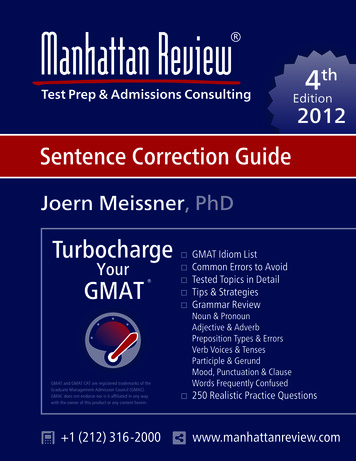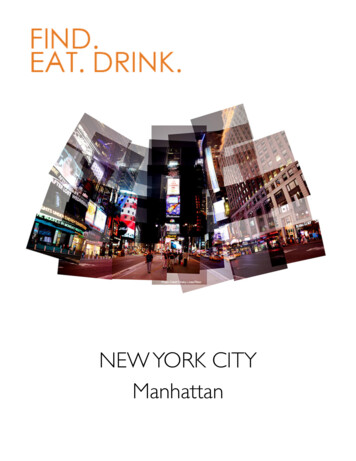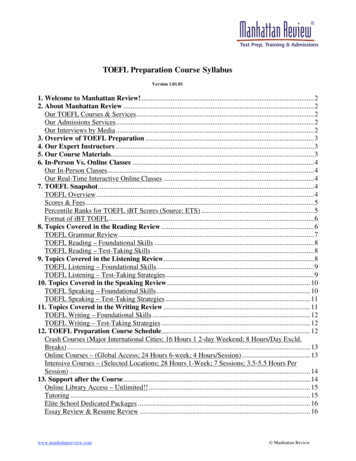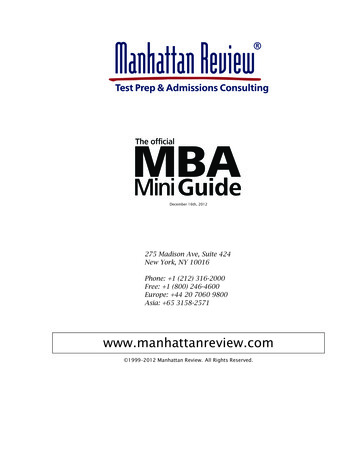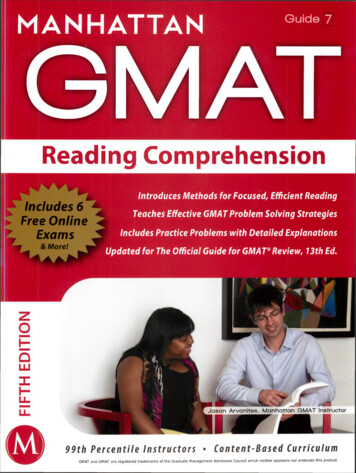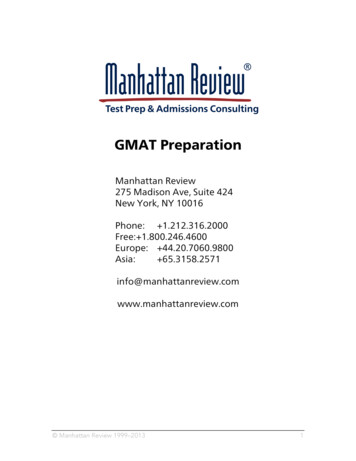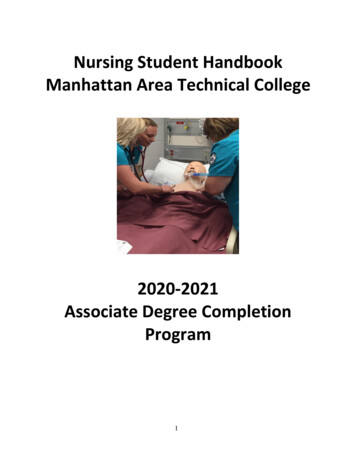
Transcription
Nursing Student HandbookManhattan Area Technical College2020-2021Associate Degree CompletionProgram1
Table of ContentsContentsDIVISION OF NURSING MISSION STATEMENT . 4DEPARTMENT OF NURSING PHILOSOPHY . 5ASSOCIATE DEGREE NURSING. 5ADN End of Program Student Learning Outcomes . 7ASSOCIATE DEGREE NURSING COURSE DESCRIPTIONS . 8GENERAL INFORMATION . 9Personal Standards . 9Address and Telephone Changes . 9Background check . 9Healthcare Agency Contacts . 9Health insurance . 9BLS . 9Counseling . 9Teaching and Learning Center . 10Dress Code for Clinical Experience . 10Seminars/Off-Campus Scheduled Activities and Attire . 10Test of English as a Foreign Language (TOEFL) . 10Employment . 10Convictions or Disciplinary Action . 11Student Representatives (Student Activity Council – SAC) . 11National Technical Honor Society. 11Phi Theta Kappa . 12Computer System Requirements . 12MATC Online and Learning Management System. 12Emergency Response & Management Plan . 12Guidelines for Accommodations for Students Enrolled in Nursing Programs . 12Student Standards of Conduct. 13ATTENDANCE . 15Policy: . 15Classroom . 15Clinical . 15GRADING, PROGESSION AND COMPLETION STANDARDS . 16Progression and Completion . 16Testing Procedure: . 17Exam Review . 17Late test and written assignment policy . 17Late assignment . 18Readmission. 18Student Success Plan . 19STUDENT HEALTH . 21Available Healthcare: . 21Immunizations . 21Nursing Essential Skills and Functional Abilities . 21Background Check . 222
List of Policies/Procedures . 223
DIVISION OF NURSING MISSION STATEMENTThe Manhattan Area Technical College (MATC) Nursing Division supports the mission of thecollege with a commitment to prepare students for employment and advancement in technicalcareers.The MATC Nursing Division prepares students to pursue nursing careers at the PracticalNursing (ADN) and Associate Degree Nursing (ADN) levels by: Providing high quality education using both academic and clinical learning environments Promoting awareness of role in health resources within the community and diverseglobal environment. Creating and maintaining a civil working and learning environment. Contributing to the advance of the nursing profession through:o Emphasis on lifelong learningo Use of evidence based practiceo Encourage membership in professional organizationsAdopted by Nursing Faculty: 11/16/98Reviewed 6/00, 5/04, 5/05, 6/06, 7/08,1/10, 8/18, 5/19Revised 6/02, 5/03, 4/07, 1/10, 10/14,4
DEPARTMENT OF NURSING PHILOSOPHYASSOCIATE DEGREE NURSINGWe believe:The Associate Degree Nursing program is designed to prepare individuals for entry level employmentand advancement in professional nursing, consistent with the mission of Manhattan Area TechnicalCollege.The consumer of nursing is an individual or group of individuals in need of assistance in maintaininglife, coping with health problems, adapting to or recovering from the effects of disease or injury,promoting health or dying in comfort and dignity. The recipient of nursing care is unique and hasvarying capacity to function in society. Each has the right to determine his or her own systems of dailyliving and to reflect his or her own personal values, motives, and lifestyles. Each has the right ofprivacy in relation to the facts of his or her health and health care.The goal of nursing is to promote an optimal state of health for the client. This goal is accomplishedby developing and implementing planned nursing care based on nursing diagnosis and treatment ofhuman responses to actual or potential health problems utilizing the American Nurses AssociationsScope and Standards of Practice (3rd ed. 2015) and NLN Outcomes and Competencies for Graduatesof Practical/Vocational, Diploma, Associate Degree, Baccalaureate, Master’s, Practice doctorate, andResearch Doctorate Programs in Nursing (2010) as guidelines. Planned nursing care creates a safephysical and psychosocial environment to protect the client from injury, infection and harm. Thedomain of nursing exists along a continuum and is organized and defined by professional and legalparameters. Associate degree nursing is found on this continuum. The associate degree nursegenerates data to provide knowledgeable care to individuals or groups of clients.Associate degree nursing education promotes the development and utilization of relevantknowledge, skills and abilities necessary for an individual to enter the practice of professional nursing.Associate degree nursing education establishes a foundation with a variety of social and biologicalscience courses. It is the responsibility of the nursing faculty to establish academic and clinicalperformance standards and to guide and evaluate student development to meet these standards.The faculty develops and maintains a curriculum that closely correlates theory with practice and isguided by the Kansas Associate Degree Nursing (ADN) curriculum alignment. Learning best occursthrough the provision of sequential learning experiences and the use of current technology. It is theresponsibility of the student to actively participate in the learning process in both classroom andclinical settings.The major concepts embedded within the Associate Degree Nursing curriculum come from theManhattan Area Technical College Division of Nursing Mission Statement, and from the studentlearning outcomes for the program. The model shown below displays those concepts.5
Upon successfully completing the Associate Degree Nursing program at Manhattan Area TechnicalCollege, the graduate is eligible to take the National Council Licensure Examination for RegisteredNurses (NCLEX-RN), and will demonstrate beginning competency as a professional nurse.Adopted by Nursing Faculty: 11/16/98Reviewed 6/00, 6/02, 6/03, 5/04, 5/05, 4/07, 7/08,8/18 , 5/19Revised 12/01, 6/06, 4/13, 5/2015,6
ADN End of Program Student Learning OutcomesManhattan Area Technical CollegeThe intention is for the student to utilize evidence-based practice and:1. Illustrate and model the ability to think critically and make safe and effective clinical judgmentsusing the nursing process.2. Identify and model caring behaviors in practicing the art and science of nursing within a diversepopulation.3. Identify and model effective communication and collaborative processes with clients andmembers of the interdisciplinary healthcare team.4. Identify and Model patient care that implements professional standards and scope of practicewithin legal, ethical, and agency policies.5. Identify and model the care and leadership needed to meet client needs using availableresources and current technology.6. Design and implement the teaching and learning processes needed to promote and maintainhealth and to reduce risks for a variety of clients.Adopted January 2011.Revised July 2014, 10/2015Revised 6/19 – *approved by KSBN minor curriculum change7
ASSOCIATE DEGREE NURSING COURSE DESCRIPTIONSNUR 201 RN Transition Course (2 SCH)Prerequisites: Admission to the ADN program. 2 credit hours (1.5 didactic, .5 lab). Focus is on therole transition from LADN to RN. Emphasis is placed on the transition of the LADN to RN role,physical assessment skills, communication, and critical thinking skills. The student’s responsibilityfor learning, self-evaluation, and collaboration is also emphasized.NUR 220 Nursing Across the Life Span (10 SCH)Prerequisite: NUR 201. 10 credit hours (7 didactic, 3 clinical). This course focuses on IV therapy,health promotion, illness prevention, and maintenance of health in acute or chronic conditions forindividuals experiencing psychological/psychiatric, maternal/child, and medical or surgical problemsacross the lifespan. Clinical experiences may be gained on the Obstetrical, Pediatric, Psychiatric, andMedical-‘surgical units. Nursing role emphasis is on organizing care for individuals using the nursingprocess. Critical thinking differentiates client needs based on age, health status, and acuity ofcondition, ethnic origins, and prognosis. The client’s role within the family, his/her occupation, andsociety are taken into account. Principles and practices of IV therapy are emphasized.NUR 230 Management of Patient Care (12 SCH)Prerequisite: NUR 220. 12 credit hours (8 didactic, 4 clinical). This course focuses on themanagement of patient care for larger groups. Health promotion and other treatment modalitiesare explored. Critical thinking is emphasized in the organization, coordination, and delegation ofclient care. Clinical experience is provided in the care of patients with more acute or complexconditions in areas such as medical, surgical, critical care, emergency room, and perioperativeservices. Leadership and management issues are explored as they relate to nursing practice.8
GENERAL INFORMATIONPersonal Standards1. Students are to model professional behavior in the classrooms, clinical facilities and anyother area where they represent nursing.2. Few designated areas are available for smoking. Hospitals and nursing homes do notallow smoking within their facilities. Smoking in uniform and the odor of smoke on one’sbreath and clothing are examples of negative health teaching.3. Neither the college nor clinical sites assume responsibility for lost or stolen articles. It isrecommended that all personal items be prominently labeled with the student's nameand that only small amounts of cash be kept on hand.4. Visitors, guests should check in at the front desk. Children always need to beaccompanied by a parent and are not allowed in the classroom unless approved byfaculty member for learning purposes.Address and Telephone ChangesIt is the student's responsibility to notify the nursing program office of changes in address or telephonenumber. At times it is critical for instructors to be able to contact students at short notice, so current contactinformation is essential.Background checkClinical contracts require that all students pass a background check. All clinical students will be asked to submitan approved background check at their expense.Healthcare Agency ContactsStudents may need a healthcare provider and a list of local agencies is provided on the nursinghomepage-online and in the nursing department / classrooms bulletin boards. These are updatedannually.Health insuranceIndividual health insurance for each student is required to cover any illness or injury that may occur duringclinical instruction. The student will provide a record of the above information to maintain a departmentrecord. This record will be requested before the first clinical rotation.BLSBasic Life Support (BLS) from American Heart Association at the Healthcare Provider level is required prior toclinical experience. This certification is to remain current throughout the program year.CounselingAs identified in the MATC Student Handbook, counseling services are available to all students.Faculty AdvisingAt the beginning of the program year, students will be assigned a nursing faculty advisor. Advisingsessions can be made during office hours or by appointment. Mandatory advising sessions will beassigned at the beginning of each semester.9
Teaching and Learning CenterTeaching and Learning Center (TLC) is staffed to assist students in locating and using resources to enhancelearning. Peer tutors can also be found in this location to help students with most subject. Walk-in as well assign up hours are available.Electronic resources, computer software and unit modules may not be removed from the site where they areto be used in the Nursing Department or TLC. Please check with the teaching and learning staff, nursingfaculty or Nursing Director if you have questions.Dress Code for Clinical ExperienceThe student must be neat, clean and appropriately dressed at all times. Contractual agreements with clinicalsites require that students are dressed in a standard program uniform with identifying name badge. Allaspects of clinical attire (uniform, stockings/ socks, shoes) should be clean, free of obvious stains and in goodrepair. Specific dress code policy from each clinical agency will also be considered as mandatory requirementsfor students (hair color, piercings, tattoos, etc.) A student who does not present himself/herself at a clinicalsite as required by the contractual agreement/policy/handbook may be denied access to clinical for that day.Seminars/Off-Campus Scheduled Activities and AttireThe attire for these activities is business casual or clinical uniform. Business casual consists of slacks, dressshirt, etc., No revealing necklines. Shoes, hose or socks should be appropriate for attire worn. Nursing studentsmust always have their “clinical uniform” with name tag when in the clinical setting. Identifying name tag mustbe worn. A student who does not present herself/himself with the appropriate attire at the activity is subjectto disciplinary action.Test of English as a Foreign Language (TOEFL)Test of English as a Foreign Language (TOEFL) may be required for applicants if English is not their primarylanguage. Nursing applicants whose primary language is not English must demonstrate English languageproficiency before being accepted into the Practical Nursing program. The test used to measure Englishproficiency as set by Manhattan Tech, is the Test of English as a Foreign Language (TOEFL): Writing: 20 Speaking: 20 Reading: 19 Listening: 20Each area must meet the minimum requirements in the categories listed above. Registration forms for testingmay be obtained from the Office of Testing of Programs and Services (Room 101) of Holton Hall on the campusof Kansas State University. A student can reach their office at 785-532-6492 or email them at testing@kstate.edu.EmploymentIt is strongly advised not to work during the MATC nursing program. If a student must work it isalso strongly advised to work no more than 12 hours per week. Employment must not conflict withclass or clinical time. Students must not work the night before a clinical day. Students are not to weartheir school uniform or patch to their place of employment. If students are employed at the sameagency as a program designated clinical site, they are never to use their work login during their clinicaltime or vice versa. Individuals who plan to be employed as health care providers in hospitals, home healthagencies, or nursing homes during the program year may practice only to the scope as defined the KansasNurse Practice Act.10
Convictions or Disciplinary ActionKansas laws governing nursing state that an individual may be denied licensure if that person has had certaincriminal convictions:KSA 65-1120 Denial, revocation, limitation or suspension of license (a) (2) to have been guiltyof a felony or to have been guilty of a misdemeanor involving an illegal drug offense unlessthe applicant or licensee establishes sufficient rehabilitation to warrant the public trust, . . . . . no license, certificate of qualification or authorization to practice nursing as . . . . . a licensedpractical nurse shall be granted to a person with a felony conviction for a crime againstpersons as specified in article 34 of chapter 21 of the Kansas Statutes Annotated and actsamendatory thereof or supplemental thereto . . .Licensure may also be denied because of past disciplinary action on a license or certificate. The Kansas StateBoard of Nursing (KSBN) staff can answer questions relating to licensure.Students are asked to notify the Director of Nursing if convicted of an offense as described above during theprogram year. An individual must maintain a Kansas LPN li
The MATC Nursing Division prepares students to pursue nursing careers at the Practical Nursing (ADN) and Associate Degree Nursing (ADN) levels by: . It is the student's responsibility to notify the nursing program office of changes in address or telephone number. At times it is critical fo
